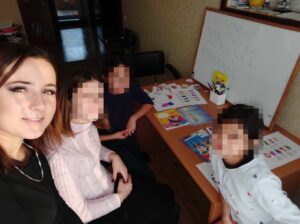Today it is Romani language day. Anastasiia Tambovtseva-Koval writes about her experience as an educator teaching the Romani language in a written form.
It is well known that while the mind can perceive many languages, the heart is most deeply touched by the native one. Good teachers understand this and take it into account when educating their students. However, an interesting phenomenon arises with so-called “non-written languages.” I would like to share my personal experience with this in relation to the Romani language.
Romani is often considered an unwritten language. Although no single official standard for Romani writing exists, a significant number of written sources in the language can be found. These are typically based on the local alphabet, the symbolic writing system used in the countries where Roma communities live. However, when it comes to education, Roma children generally learn to read in the local language, usually the dominant language taught in schools.
But does the language in which one learns to read make a difference? What happens when the native language and the school language are different? How does it affect the attitude towards the mother tongue? I found my answer when I started conducting volunteer literacy lessons with Roma children. Many of them did not attend school due to various challenges, while others, though enrolled, struggled with their studies. Therefore, I tried to help them develop basic literacy skills.

One day, after learning some letters, I invited the children to write and read some words in Romani on the whiteboard. They enthusiastically agreed. I wrote words such as DAD (father) and DOROV (hello, as spoken by Roma in Ukraine). When the children read them aloud, they continued staring at the words with an expression of wonder. It was an incredible moment – one that still gives me goosebumps! I had known that information transmitted in one’s native language, the mother tongue, always touches the heart more strongly and affects feelings more than in another learned language. And in practice, I have seen many times how people were fascinated by the fact that something important was written in their native language. But at that moment I felt something deeper. The children sat as if enchanted and looked at these words written in Romani. Something touched the deepest feelings of their souls. Why did these simple words make such a strong impression? At the time, I could not fully understand their reaction. But I was sure that it was not just an admiration.
I found the answer a little later, when I researched the peculiarities of intercultural communication of Roma in educational institutions. In one of the studies, it was explained that an important concept of world perception of the Roma is a sharp contrast between their own and foreign cultures. And against this background, the difference in language models is the reason why the written tradition and book culture are perceived as foreign and uncharacteristic of the Roma.
This was the key to understanding why those children reacted so strongly. Before that, they had believed that Romani was not a written language. That reading and writing were only possible in foreign languages, in gadjikano (non-Romani). But at that moment, a complete revolution took place in their world: it turns out that it is possible to write in the Romani language! This realization ignited a newfound appreciation for their mother tongue. One girl even told me that she wants to learn to read, but only Romanes.


Two books for teaching Romani
Children were most proud when they knew how to write their names in Romani. Some of them did not have paper and pens at home. Therefore, when returning home, they found a place in their yard with sand or soft earth and wrote their names there, tracing the letters with their feet on the ground. And they bragged to each other that they were able to write their names. And a week later, when we met again for literacy lessons, they boasted that they still remember how to spell their names. And they could even write the names of their friends. It was great! I am still very proud of them!

From my experience, I am convinced that laying the foundations of reading in one’s native language has a profound effect on a child’s worldview and their perception of literacy as a part of their own culture, and not just as a means of survival in the modern world among foreign cultures. The use of the mother tongue allows you to make the educational process interesting and exciting, which has a positive effect on success in school and assimilation of the studied material. And most importantly, it allows students to engage not only with their minds but also with their hearts and souls.
LINKS
Instagram:
Pro.Romani (eng) https://www.instagram.com/pro.romani/
Pro.Romani (ua) https://www.instagram.com/pro.romani.ua/
Personal https://www.instagram.com/ankovalia/
Personal https://www.facebook.com/anastasiia.tambovtseva
Pro.Romani https://www.facebook.com/pro.romani.at/
TikTok
Pro.Romani (eng) https://www.tiktok.com/@pro.romani/
Pro.Romani (ua) https://www.tiktok.com/@pro.romani.ua
Rromano alfabeto project
Web site https://rromanoabc.minisite.ai/
Cartoon https://youtu.be/zd4h62mzRhA
MobApp
iOS https://apps.apple.com/ua/app/rromano-alfabeto/id6473124743
Workbook https://drive.google.com/file/d/1CFyodXiTiXOAtJ6WV1sx3hqF2GxjJJuQ/view
Ginas Rromanes project
Cartoon https://youtu.be/eFeGoKhkuSU?si=uGzz58s8H98W97oc
Workbook https://drive.google.com/file/d/1Biy5FsKBORxBW-MOv0LGlGsGuBLVoF8m/view
Flashcards https://drive.google.com/file/d/1wL9T2UgzUlOvQiR3kuKXw8Y4i3y77Zxi/view
Anastasiia Tambovtseva-Koval is an educational influencer, promoter of the Romani language, history and culture, host of a pro-romani blog, tutor, and entrepreneur.







